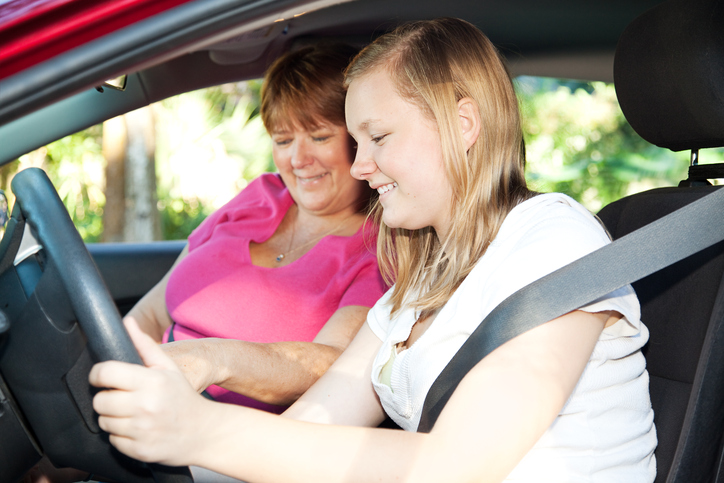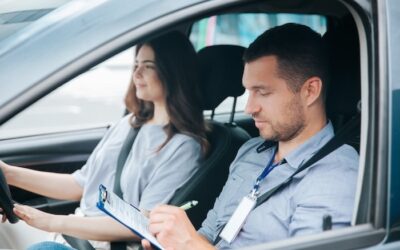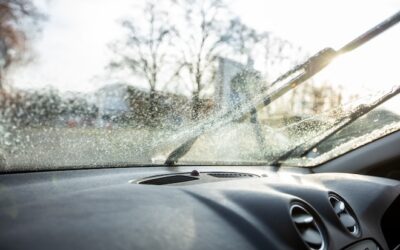Practicing outside of driving lessons is a great way for learners to get some additional experience, which can go a long way towards helping them pass their test. Many parents of learner drivers choose to help their children by taking them out to practice, however, learners can also be taken out by friends and relatives who meet the criteria. It can sound like a daunting prospect, however, supervising a learner driver will benefit you both. For the learner, it is a great way of increasing their confidence on the road. For you, it will provide reassurance that they will be safe to go out alone once they pass their test.

Who Can Supervise a Learner?
Most parents will meet the criteria for being a suitable accompanying driver to a learner. You have to be aged at least 21, and hold a full driving licence, and have held it for the type of vehicle you are supervising for at least 3 years. This means that if you are only permitted to drive an automatic car, you cannot supervise somebody learning to drive a manual vehicle. A learner driving without a suitable supervisor can be fined up to £1000, and receive six penalty points on their provisional licence.
Can a supervisor have points on their licence?
As a supervisor, having points on your licence will not prevent you from accompanying a learner driver. Bear in mind though, if you have been disqualified from driving for a period of time, this is not counted towards the three years you must have held your licence for, even if you now have your licence back.
What Rules Apply To a Supervisor?
The best way to think of it is that you should act as if you are the driver yourself. Not only do you have a legal responsibility, you never know when the learner might get into a situation they are uncomfortable with and ask you to take over driving.
Road traffic laws apply to you
Road traffic laws still apply to you, so you cannot supervise a learner whilst:
- Under the influence of drink or drugs
- Using a handheld mobile phone
- Not wearing glasses or contact lenses if required to do so while driving
- Sleeping
- Taking medication that prohibits you from driving
As you are considered to be in control of the vehicle while supervising a learner, the penalties for these offences are the same as they would be if you were driving yourself. This means that depending on the severity of the offence, you could receive a fine, points on your licence, or even be sent to prison.
Vehicle safety
Check the vehicle over before you get started. Asking your learner to check things such as the tyres, lights, mirrors, windows and fluids while you watch over them will not only get them into a good habit, it will help them with the ‘show me, tell me’ part of their driving test.
‘L’ plates (or ‘D’ plates in Wales) must be clearly on display at any time the learner is in control. ‘L’ plates must be clearly visible to other vehicles from both the front and rear, which means the car will need to have one on the front, and another on the back. The ‘L’ plates should not restrict vision, so should be fixed to the bonnet, boot or bumper, rather than a window. Failure to display ‘L’ plates appropriately could see the learner receive up to six penalty points on their licence.
Payment
Unless you are a DSA approved driving instructor, you cannot take any sort of payment for supervising a learner driver. While most parents wouldn’t consider charging their own children, remember that this also applies to friends or relatives who offer to help.
Who Is Responsible For Driving Offences?
This is one of the first questions many parents ask when considering teaching their children how to drive. Unlike a driving instructor, you are unlikely to have dual controls, so other than giving your learner verbal instructions, there is little you can do to prevent them from doing something they shouldn’t.
Learners are expected to be aware of traffic laws before they start driving, so it is ultimately their responsibility to abide by them. If, for example, you are supervising a learner who is caught speeding, it is them who will face a fine and points on their licence, not you. If the car they are using belongs to you, it will be you who will initially receive a letter, to which you will have to respond, nominating the learner you were supervising as the driver at the time of the offence.
Who Is Responsible For Accidents?
As with driving offences, it is the person behind the wheel who will be held responsible in the event of an accident in most circumstances. If you are deemed not to be in control of the vehicle, for example you are under the influence of alcohol, you could however still see yourself penalised.
As their supervisor, a big part of your role is to watch the road, and make sure the person you are supervising is aware of any potential hazards up ahead. Ultimately though, it is up to them to drive carefully, and take evasive action where necessary. It is therefore important to make sure the learner is insured, whether it is their own car, or yours that they are driving.
What About Parking Tickets?
Parking tickets are a bit more complicated, as depending on where the vehicle was parked and what type of ticket you get, your legal position will vary. In most circumstances, it is the driver who is responsible for paying for the parking ticket, although unlike a driving offence such as speeding, you have a bit more control over the situation, as you may have some input into where a suitable place to park would be, and perhaps the opportunity to move the vehicle should your learner choose to park the car somewhere they shouldn’t. Parking tickets do not put points on anybody’s licence, so if you do receive a ticket, you may find it easier to simply agree amongst yourselves who should pay.
Along with all of the above, you should also make sure that you feel confident and experienced enough to supervise a learner, for both of your safety. If you do not feel comfortable with the idea of supervising a learner, don’t do it. You can always accompany them as a back seat passenger if you are able to find a suitably qualified friend or relative to supervise them instead.



